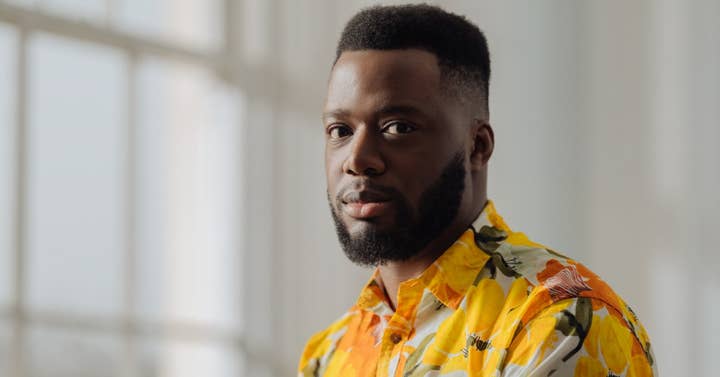"Until I'm old and grey, I'm going to keep turning my silly ideas into games"
Taiwo Omisore discusses his path to becoming a self-taught mobile developer, and why he's keen for it to remain a hobby
Taiwo Omisore is a prime example of a hobbyist developer.
While many indies are working every hour they can manage in trying to realise their vision, hoping it will be that big, life-changing hit, Omisore fits his development into his spare time. In fact, he originally began making games on the commute.
His career (the non-games one that pays the bills) has taken many turns, starting as a baker before working in customer service at Tesco and later a buyer. It was during his tenure as the latter that he found himself with three hours to kill on the train every day.
"So I just built an app," he tells GamesIndustry.biz. "I used to talk to people on the train and say, 'Excuse me, random person, I'm building this app. Would you like to test it?' And people would look at me weird, and say, 'Okay,' and try this game out. And I'd talk to friends and family. And I just really enjoyed it. I knew that this was something that I wanted to do.

"Having the creative freedom to build these experiences that people could play was just the most incredible feeling. I've been playing video games ever since I was a little child. My mum made a really big mistake and was given a NES, and [for] me and my twin brother -- who were four at the time -- it was game over. I've just been hooked ever since."
To date, Omisore has developed eight apps for mobile, seven of them being games -- he was even featured in this year's Ensemble exhibition during the London Games Festival. His titles range from casual arcade-style games like SpaceBots and sequel SpaceBots Match, to endless runner Cube Sprint, to the quirky 1 Chance, a collection of mini-games that you can only ever play once.
All his games are freely available on the App Store, and were released after Omisore taught himself how to develop games via the abundance of online and video tutorials available today. While he has always enjoyed maths, and learned to love game design and programming, the key to finding his state in games has been persistence, he tells us.
"That really is key," he says. "Building really small, basic games, and then building on my experience [making] that, and then going on to the next level.
"I think the most important thing was not being afraid to ask. I remember asking questions on Stack Overflow, just being like, 'I've got this programming problem,' and random people on the internet would say, 'This is how you fix it.' But I would not be afraid to say, 'Sorry, I know you're taking your time out to help me, but can you explain in more detail?'
"I'm a very visual learner, so I would have to look at things and see how they work. So, the concept of an array in computing is a collection of things, but in my head, I just think about it as a filing cabinet full of data. Someone else might approach it in a different way, but that's just the way that I approach it, and just doing things over and over and over again."
"I've met some incredible people using social media, but I think as a solo developer, sometimes you might be in your own little silo"
He's also quick to praise fellow developers, and encourages anyone just getting started to "put themselves out there."
"I've met some incredible people using social media, but I think as a solo developer, sometimes you might be in your own little silo. And in a situation where you've got a product, it's your own little baby, you're not getting the input from an outside community, it can be quite difficult.
"But if you're willing to embrace social media, if you're willing to drop an email, a lot of people are very receptive to that. There are a lot of people that I'm very inspired by. People like to talk about themselves, so if you put yourself out there and say, 'Hey, look, I think you're great. Would you like to have a chat about what you do?' More often than not, people are very receptive to that.
"There are some incredible, inspiring, very, very deeply creative and talented people out there. It's just about how you navigate that."
He has also taken the opportunity to help encourage the next generation, emphasising that teaching yourself games development can be just as valid a path into the business. The trick is making the process of coding games seem less daunting.
"I've been to a few primary and secondary schools to talk about game programming, and when you explain to them that things are very literal -- like you're telling a computer to do X when a certain condition is met -- people are like, 'I understand it.' It's a lot to get your head around, but if you can explain it to someone, a very complicated thing in a very simple way, people can understand, and it's just building that knowledge one by one.
"Until I'm old and grey and I can't type on a keyboard any more, I'm going to carry on turning my silly ideas into games"
"Because I was in the same position, I was like, 'There is no way that I'll be able to do this, especially by myself.'"
What helps, at least in Omisore's case, is that there is no financial pressure. All of his apps are free, there are no in-app purchases or monetisation. This is, after all, a hobby.
"I just build stuff that I like to build," he says when asked why he hasn't chosen to make games his career. "I think it would be very difficult for me to take those skills into an environment where I might just be working on one thing, because currently I've got total creative freedom. I do programming, I do the sound, I do the animation, I do the marketing. I'm a one-man band. And being in a situation where that's different would be challenging.
"I don't want to say that I've pigeonholed myself, because I love working with a team and all the rest of it, but I think having that creative freedom is something that's very important to me, and maybe one of the reasons why I haven't."
And although his game-making ambitions remain fairly casual, he has zero plans to stop developing new ones.
"I love making games. It's such a creative expression of art, and I think it brings people together. I've met some of the most amazing people through gaming, online gaming, making games, events like [London Games Festival], and going to games conferences when I was younger.
"Someone from the other side of the world sent me an email saying, 'Hey, Tai, I played your game every single day through the pandemic. It really got me through a difficult time.' I get really emotional that something that I built, someone would get enjoyment from.
"Until I'm old and grey and I can't type on a keyboard any more, I think I'm going to carry on just turning my silly ideas into games, and hope that people enjoy them."









